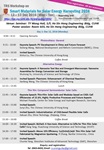Invited Speech:
Sb2Se3: A non-toxic alternative to CdTe for thin film solar cells?
Jiang Tang1*, Liang Wang1, Ying Zhou1, Chao Chen1
1 Wuhan National Laboratory for Optoelectronics, Huazhong University of Science and Technology.
*E-mail: jtang@mail.hust.edu.cn
 |
Prof. Jiang Tang Professor Wuhan National Laboratory for Optoelectronics, Huazhong University of Science and Technology (HUST) |
Date: 12 Dec 2016 (Mon)
Time: 4:00 - 4:30pm
Venue:
TY Wong Hall, 5/F, Ho Sin Hang Engineering Building, CUHK
Abstract:
CdTe is the most competitive thin film technology in the market due to its high efficiency (22.1% in the lab and 18% for the module), low cost (~$0.05/Wp), and reliable operation (10GW has been installed and work well). However, Cd is toxic and Te is scarce and expensive. We are working on replacing CdTe with a new absorber, Sb2Se3, which is nontoxic, low-cost and possesses excellent optical and electrical properties1. Through nearly 4 years intensive work, we have gradually understood the fundamental properties of Sb2Se32 and have produced a superstrate Sb2Se3 thin film solar cell with 6.5% certified efficiency and outstanding stability. Furthermore, the method used for Sb2Se3 film deposition, rapid thermal evaporation, is quick and inexpensive, and highly adaptable to current CdTe production lines.
References:
[1] Y. Zhou, J. Tang, et. al. Nature Photonics, 2015, 9, 409.
[2] C. Chen, J. Tang, et. al. submitted.
About speaker:
Jiang Tang is a full professor at Wuhan National Laboratory for Optoelectronics, Huazhong University of Science and Technology. He obtained his Ph.D from University of Toronto in 2010 under the supervision of Prof. Edward Sargent and afterwards did his postdoctoral research at IBM T. J. Watson Research center. He started his group in 2012 and has focused his research mainly on next generation solar cells including Sb2Se3 and CuSbSe2 thin film solar cells and PbS colloidal quantum dot photovoltaics. He has published 70 journal papers including a few in Nature Photonics and Nature Materials which earnt him >3300 citations. He is the recipient of the 1000 Young Talent program of Chinese government and the National Natural Science Funds for Outstanding Young Scholar, and also an editor of Frontiers in Optoelectronics.
Date, time and venue:
Seminars:
12 Dec 2016 (Mon) 9:00 - 17:30
13 Dec 2016 (Tue) 9:30 - 15:30
TY Wong Hall, 5/F, Ho Sin Hang Engineering Building, CUHK
Poster session:
(Concurrent to seminars)
Room 603, Ho Sin Hang Engineering Building, CUHK
Organizing Committee:
- Prof. Jianbin Xu, Prof. Jimmy Yu, Prof. Xudong Xiao, and Miss Mandy Tse
- Email: mandytse [at] erg.cuhk.edu.hk
Workshop Archive:


